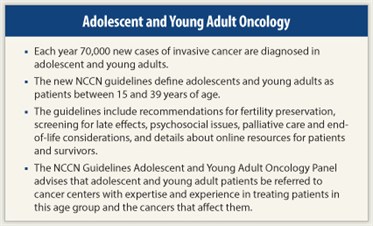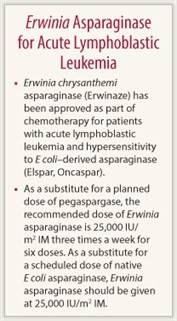April 15, 2012 (View All Issues)
 Imatinib mesylate tablets (Gleevec) approved for the adjuvant treatment of adult patients following complete gross resection of Kit (CD117) positive gastrointestinal stromal tumors (GIST).
Imatinib mesylate tablets (Gleevec) approved for the adjuvant treatment of adult patients following complete gross resection of Kit (CD117) positive gastrointestinal stromal tumors (GIST).- Vismodegib capsules (Erivedge) approved for the treatment of metastatic basal cell carcinoma or locally...
Neoadjuvant Aromatase Inhibitor Therapy Converts Many Patients to Candidates for Breast-conserving Surgery
 The American College of Surgeons Oncology Group (ACOSOG) Z1031 trial examined the effect of neoadjuvant aromatase inhibitor therapy on clinical response and breast-conservation rates in postmenopausal women with estrogen receptor (ER)-rich stage II or III breast cancer. An update of the surgical...
The American College of Surgeons Oncology Group (ACOSOG) Z1031 trial examined the effect of neoadjuvant aromatase inhibitor therapy on clinical response and breast-conservation rates in postmenopausal women with estrogen receptor (ER)-rich stage II or III breast cancer. An update of the surgical...
Our Patients, Our Teachers
There is no greater professional satisfaction than the knowledge that you have cared for a patient and the care brought an improvement in the patient's health. Regardless of the level of appreciation, whether the patient is cured or not, and even if the patient's sense of well-being may be...
ACCC Meeting Focuses on Affordable Care Act: Its Future, and What It Might Accomplish
The Association of Community Cancer Centers (ACCC) mid-March Annual Meeting devoted several sessions to the Patient Protection and Affordable Care Act: Will it still be here after the Supreme Court decides its fate? If so, how much of it will survive, and how will it affect oncology practice?
In...
‘We Need an Index of Biologic Aging’
As a retired elderly (soon to be 83-year-old) oncologist, I read the recent article on the subject of geriatric oncology, in the March 15 issue of The ASCO Post, with great interest ("Moving the Field of Geriatric Oncology Forward," by Stuart M. Lichtman, MD, FACP, FASCO.) This was particularly so...
ASCO Releases Palliative Care Provisional Clinical Opinion
 ASCO has released a provisional clinical opinion (PCO) addressing the integration of palliative care services into standard oncology care.1 The ASCO Post recently spoke with one of the PCO’s lead authors, Thomas J. Smith, MD, Director of Palliative Care for Johns Hopkins Medicine and the Johns...
ASCO has released a provisional clinical opinion (PCO) addressing the integration of palliative care services into standard oncology care.1 The ASCO Post recently spoke with one of the PCO’s lead authors, Thomas J. Smith, MD, Director of Palliative Care for Johns Hopkins Medicine and the Johns...
Targeting KRAS in GI Cancers: The Hunt for the Holy Grail in Cancer Research
The RAS oncogenes are the most frequently mutated class of oncogenes in human cancers, and this has prompted a search for Ras inhibitors to effectively treat tumors with these mutations. Despite intensive efforts, however, none has materialized clinically because K-Ras is proving to be a very...
Survival Analysis by Gastric Cancer Subtypes in AVAGAST Phase III Trial
 Subset analysis of the AVAGAST trial, which evaluated the benefit of bevacizumab (Avastin) in advanced gastric cancer, has demonstrated distinct differences in outcomes according to disease subtype, reported Manish A. Shah, MD, of Weill Cornell Medical College and New York Presbyterian Hospital, at ...
Subset analysis of the AVAGAST trial, which evaluated the benefit of bevacizumab (Avastin) in advanced gastric cancer, has demonstrated distinct differences in outcomes according to disease subtype, reported Manish A. Shah, MD, of Weill Cornell Medical College and New York Presbyterian Hospital, at ...
Controlled Study Links ‘Chemobrain’ to Longitudinal Changes in Brain
The phenomenon called “chemobrain”—impaired cognitive functioning following chemotherapy—correlates with longitudinal changes in the brain’s white matter, according a recent study in the Journal of Clinical Oncology.1 Structural changes in the white matter, measured by magnetic resonance diffusion...
George Kovach, MD, Named as President of the Association of Community Cancer Centers
 George Kovach, MD, became President of the Association of Community Cancer Centers (ACCC) at its 38th Annual National Meeting in March 2012. Dr. Kovach is the medical director of the Genesis Cancer Center, Davenport, Iowa, and one of the founding members of the Iowa Oncology Society (IOS).
George Kovach, MD, became President of the Association of Community Cancer Centers (ACCC) at its 38th Annual National Meeting in March 2012. Dr. Kovach is the medical director of the Genesis Cancer Center, Davenport, Iowa, and one of the founding members of the Iowa Oncology Society (IOS).
“I am...
Study Shows Concurrent Chemoradiation Therapy to be a Viable Strategy for Muscle-invasive Bladder Cancer
 Combined-modality therapy provides a bladder-sparing alternative to radical cystectomy with comparable outcomes in patients with muscle-invasive bladder cancer, according to a pooled analysis of six Radiation Therapy Oncology Group (RTOG) trials.1 The study included 468 patients and showed that...
Combined-modality therapy provides a bladder-sparing alternative to radical cystectomy with comparable outcomes in patients with muscle-invasive bladder cancer, according to a pooled analysis of six Radiation Therapy Oncology Group (RTOG) trials.1 The study included 468 patients and showed that...
Short-term Hormone Therapy Did Not Increase Risk of Cardiovascular Death in Men with Localized Prostate Cancer, RTOG 94-08 Trial Finds
Short-term androgen deprivation therapy does not appear to increase cardiovascular mortality in men with clinically localized prostate cancer, according to a post hoc analysis of a large Radiation Therapy Oncology Group (RTOG)-sponsored clinical trial.1
 “Our study analyzes data from a large...
“Our study analyzes data from a large...
SELECT Trial Update: Vitamin E Fails to Prevent Prostate Cancer in Healthy Men, Appears to Increase Risk
 Supplements touted as preventing prostate cancer may turn out to be dangerous, as is evident from updated results of the largest long-term prevention trial, called the Selenium and Vitamin E Cancer Prevention Trial (SELECT). Final analysis of SELECT showed that, compared to placebo, vitamin E alone ...
Supplements touted as preventing prostate cancer may turn out to be dangerous, as is evident from updated results of the largest long-term prevention trial, called the Selenium and Vitamin E Cancer Prevention Trial (SELECT). Final analysis of SELECT showed that, compared to placebo, vitamin E alone ...
NCCN Announces New Guidelines for Adolescent and Young Adult Oncology
 The National Comprehensive Cancer Network (NCCN) announced that it has issued new NCCN Clinical Practice Guidelines in Oncology for Adolescent and Young Adult (AYA) Oncology.1 Adolescent and young adult patients are defined in the guidelines as individuals 15 to 39 years of age at initial cancer...
The National Comprehensive Cancer Network (NCCN) announced that it has issued new NCCN Clinical Practice Guidelines in Oncology for Adolescent and Young Adult (AYA) Oncology.1 Adolescent and young adult patients are defined in the guidelines as individuals 15 to 39 years of age at initial cancer...
Radiation Oncologists Are Discussing Infertility Risks with Young Patients
More than 80% of radiation oncologists discuss the impact of cancer treatments on fertility with their patients of childbearing age. This can lead to improved quality of life for young patients with cancer, according to a study in Practical Radiation Oncology.1
In the past, the clinical focus for...
Surgeon General Releases New Report on Youth Smoking
 The fight against tobacco use among young people was accelerated recently by Surgeon General Regina M. Benjamin, MD, MBA, with the release of the Surgeon General’s Report, Preventing Tobacco Use Among Youth and Young Adults. This report details the scope, health consequences, and influences that...
The fight against tobacco use among young people was accelerated recently by Surgeon General Regina M. Benjamin, MD, MBA, with the release of the Surgeon General’s Report, Preventing Tobacco Use Among Youth and Young Adults. This report details the scope, health consequences, and influences that...
An Expert Shares Insight into the Future of Lung Cancer Treatment
 Despite growing national focus on early detection, prevention, and new molecular-based treatments, lung cancer persistently remains the number 1 cause of cancer death for men and women in the United States. The ASCO Post spoke to lung cancer specialist Paul A. Bunn, Jr, MD, Executive Director,...
Despite growing national focus on early detection, prevention, and new molecular-based treatments, lung cancer persistently remains the number 1 cause of cancer death for men and women in the United States. The ASCO Post spoke to lung cancer specialist Paul A. Bunn, Jr, MD, Executive Director,...
Not All KRAS Mutations Are Alike in Non–Small Cell Lung Cancer
Mutations in the KRAS oncogene play a critical role in cancer cell growth and resistance to treatment. In colorectal cancer, the presence of any mutant amino acid substitution in the K-Ras protein predicts a poorer response to targeted therapy. In non–small cell lung cancer (NSCLC), however, there...
Summary of ASCO Provisional Clinical Opinion on Palliative Care
The ASCO provisional clinical opinion on palliative care recently published1 was based largely on data from seven published randomized controlled trials, including a phase III lung cancer trial by Temel and colleagues, which was the trigger for the new recommendations.2 The trial’s principal...
ACCC Releases Survey on ‘Oncology Medical Home’
The Association of Community Cancer Centers (ACCC) released findings from a survey that explores how community-based cancer care programs view the concept of the “oncology medical home”—a patient-centered model for coordinated care, whereby payers would reimburse physicians for services that keep...
Cancer Informatics: A Future Necessity, but Challenges Abound
The National Cancer Policy Forum of the Institute of Medicine (IOM) recently convened a workshop on cancer informatics to examine and discuss needs and challenges facing biomedical researchers, which will in turn affect the way oncology is practiced in the future.
“This is a time of huge...
2012 Breast Cancer Symposium to Expand Tumor Board Session, Add ‘Meet the Professors’ Session
 The days of attending the Breast Cancer Symposium, just quietly listening to useful lectures, and then going home are over. In recent years, the meeting’s sponsors and planners have worked to make the 3-day gathering far more interactive and as intimate as a meeting with 1,500 attendees can be.
The days of attending the Breast Cancer Symposium, just quietly listening to useful lectures, and then going home are over. In recent years, the meeting’s sponsors and planners have worked to make the 3-day gathering far more interactive and as intimate as a meeting with 1,500 attendees can be.
Help Your Patients Understand Cost of Care
![]() Encourage your patients to review ASCO’s newly updated Managing the Cost of Cancer Care booklet, which can help them make informed treatment decisions. This resource explains the various costs associated with cancer treatment, key provisions in the 2010 health-care reform law that are now being...
Encourage your patients to review ASCO’s newly updated Managing the Cost of Cancer Care booklet, which can help them make informed treatment decisions. This resource explains the various costs associated with cancer treatment, key provisions in the 2010 health-care reform law that are now being...
ASCO Advocates for Solutions to Oncology Drug Shortage Crisis
![]() ASCO continues to call for three specific actions by Congress to help avert shortages of essential treatments for children and adults living with cancer. ASCO President Michael P. Link, MD, outlined the priorities in February at an FDA news briefing on the recent methotrexate and liposomal...
ASCO continues to call for three specific actions by Congress to help avert shortages of essential treatments for children and adults living with cancer. ASCO President Michael P. Link, MD, outlined the priorities in February at an FDA news briefing on the recent methotrexate and liposomal...
Research of Two 2012 Foundation Merit Award Recipients Highlighted
 Studies led by Nathan Sheets, MD, and Mark Jesus Magbanua, PhD, were recently featured in the Genitourinary Cancers Symposium press program. Both researchers are 2012 Conquer Cancer Foundation of ASCO Merit Award recipients, and each has made noteworthy discoveries in prostate cancer.
Studies led by Nathan Sheets, MD, and Mark Jesus Magbanua, PhD, were recently featured in the Genitourinary Cancers Symposium press program. Both researchers are 2012 Conquer Cancer Foundation of ASCO Merit Award recipients, and each has made noteworthy discoveries in prostate cancer.
2012 Annual Meeting to Highlight NCI’s ‘Provocative Questions’ and Offer First-ever Pre–Annual Meeting Seminars
 As this year’s ASCO Annual Meeting was being planned, the NCI was developing and releasing its “Provocative Questions” project—an effort to stimulate the cancer community to ask itself 24 key questions in order to advance the treatment of cancer and provide better care.
As this year’s ASCO Annual Meeting was being planned, the NCI was developing and releasing its “Provocative Questions” project—an effort to stimulate the cancer community to ask itself 24 key questions in order to advance the treatment of cancer and provide better care.
It quickly became clear to...
AACR Inducts Frank McCormick, PhD, FRS, DSc (hon) as President; Elects Charles L. Sawyers, MD, as President-elect, 2012-2013
 Leadership of the American Association for Cancer Research (AACR) inducted Frank McCormick, PhD, FRS, DSc (hon), as President of the society during the AACR Annual Meeting held earlier this month
Leadership of the American Association for Cancer Research (AACR) inducted Frank McCormick, PhD, FRS, DSc (hon), as President of the society during the AACR Annual Meeting held earlier this month
Dr. McCormick is the Director of the University of California, San Francisco (UCSF) Helen Diller...
New Biomarker Predicts Survival in Advanced Prostate Cancer
Researchers at Memorial Sloan-Kettering Cancer Center have developed the Bone Scan Index (BSI), which is the first quantitative imaging response biomarker that can assess response to treatment and prognosticates for survival in men with metastatic castration-resistant prostate cancer.
Based on...
Advances in Axillary Surgery for Patients with Breast Cancer
 Results from the American College of Surgeons Oncology Group (ACOSOG) Z0011 trial, which found no benefit for completion axillary nodal dissection in patients with breast cancer involving one to two positive sentinel nodes,1 have led to changes in breast cancer management, though points of...
Results from the American College of Surgeons Oncology Group (ACOSOG) Z0011 trial, which found no benefit for completion axillary nodal dissection in patients with breast cancer involving one to two positive sentinel nodes,1 have led to changes in breast cancer management, though points of...
Treating Acute Promyelocytic Leukemia without Chemotherapy
Throughout the course of medical history, we have witnessed innovations that have initially been met with skepticism but have later revolutionized our management of patients with specific disorders. The recent history of oncology drug development is full of instances where a drug that was...
Update on Novel Anticoagulants: Dabigatran Etexilate
Efficacy and safety of traditional anticoagulants (eg, vitamin K antagonists) are well recognized, given their long-standing use in clinical practice. However, the novel anticoagulants have several potential advantages over the vitamin K antagonists. Even so, in light of their recent introduction...
ODAC Offers Recommendations on Two Sarcoma Drugs

The FDA’s Oncologic Drugs Advisory Committee (ODAC) recently recommended approval of one drug for sarcoma but rejected another. The panel voted 11 to 2 that clinical studies support a favorable benefit-risk assessment for use of pazopanib (Votrient) in treating patients with advanced soft-tissue...
FDA Commissioner Statement: Surgeon General’s Report on Youth Smoking
 The recent report on “Preventing Tobacco Use Among Youth and Young Adults” by the Surgeon General not only documents the devastating consequences of tobacco use for our nation’s youth, but also represents a clarion call for bold action at every level of government to implement proven strategies to...
The recent report on “Preventing Tobacco Use Among Youth and Young Adults” by the Surgeon General not only documents the devastating consequences of tobacco use for our nation’s youth, but also represents a clarion call for bold action at every level of government to implement proven strategies to...
FDA Approves New Silicone Gel–filled Breast Implant
 The FDA recently approved a silicone gel-filled breast implant manufactured by Sientra Inc for breast augmentation in women at least 22 years old and breast reconstruction in women of any age. As a condition of approval, Sientra is required to conduct postapproval studies that will assess long-term ...
The FDA recently approved a silicone gel-filled breast implant manufactured by Sientra Inc for breast augmentation in women at least 22 years old and breast reconstruction in women of any age. As a condition of approval, Sientra is required to conduct postapproval studies that will assess long-term ...
Erwinia chrysanthemi Asparaginase for Acute Lymphoblastic Leukemia in Patients with Hypersensitivity to E coli–derived Asparaginase
In the Clinic provides overviews of novel oncology agents, addressing indications, mechanisms, administration recommendations, safety profiles, and other essential information needed for the appropriate clinical use of these drugs.
Erwinia chrysanthemi asparaginase (Erwinaze) was...
New Data Guide Treatment for Rare Form of Hodgkin Lymphoma
Nodular lymphocyte predominant Hodgkin lymphoma (NLPHL) accounts for approximately 5% of Hodgkin lymphoma cases. It is distinguished from classic Hodgkin lymphoma by a variety of clinical and pathologic features, including expression of B-cell associated antigens such as CD20. Given that the...
Liposomal Vincristine Receives Positive Vote from ODAC
 Talon Therapeutics, Inc, announced the Oncologic Drugs Advisory Committee voted 7 yes, 4 no, and 2 abstain that evidence from clinical studies supports a favorable benefit-risk assessment for use of vincristine sulfate liposomes injection (Marqibo). The manufacturer is seeking an indication for the ...
Talon Therapeutics, Inc, announced the Oncologic Drugs Advisory Committee voted 7 yes, 4 no, and 2 abstain that evidence from clinical studies supports a favorable benefit-risk assessment for use of vincristine sulfate liposomes injection (Marqibo). The manufacturer is seeking an indication for the ...
FDA Drug Approvals, January–April 2012
Cancer Does Not Have to Be a Death Sentence
 When I found a large amount of blood on my toilet tissue just before Thanksgiving in 2010, I wasn’t too concerned. At just 45 years old, I was in excellent health, and other than the bloody stool I had no other symptoms signaling that something was seriously wrong. My primary care physician thought ...
When I found a large amount of blood on my toilet tissue just before Thanksgiving in 2010, I wasn’t too concerned. At just 45 years old, I was in excellent health, and other than the bloody stool I had no other symptoms signaling that something was seriously wrong. My primary care physician thought ...
ASCO’s Blueprint Sets Goals for Accelerating Cancer Progress
ASCO recently issued a report, Accelerating Progress Against Cancer: ASCO’s Blueprint for Transforming Clinical and Translational Cancer Research, which outlines the Society’s 10-year plan for improving cancer outcomes. Central to achieving that goal are three steps, including (1) therapy...
Oncology Professionals and Leaders to be Honored at ASCO Annual Meeting
Each year through its Special Awards Program, ASCO recognizes researchers, patient advocates, and leaders of the global oncology community who, through their work, have made significant contributions to enhancing cancer care. These recipients of ASCO’s highest, most prestigious awards collectively...
Thomas J. Smith, MD, Appointed Director of Palliative Care, Johns Hopkins Medicine and Sidney Kimmel Comprehensive Cancer Center
 Thomas J. Smith, MD, has joined Johns Hopkins as the Director of Palliative Care for Johns Hopkins Medicine and the Hopkins’ Sidney Kimmel Comprehensive Cancer Center.
Thomas J. Smith, MD, has joined Johns Hopkins as the Director of Palliative Care for Johns Hopkins Medicine and the Hopkins’ Sidney Kimmel Comprehensive Cancer Center.
Before joining Johns Hopkins, Dr. Smith served as the Medical Director of the Thomas Palliative Care Program and the Co-director...
Targeted Massively Parallel Sequencing Identifies Clinically Relevant Alterations in Cancer Genes
Systematic methods for profiling tumor genomic alterations remain underdeveloped, with current clinical profiling usually being confined to identification of limited numbers of oncogene point mutations. At present, there is no systematic technique for interrogating tumor samples in situ for a...
Targeted Mutations in ATR Pathway and Implications for Combination Strategies
Many chemotherapy agents work by causing DNA strand breaks or accumulation of DNA replication intermediates. ATR (ataxia-telangiectasia mutated and Rad 3-related protein) is a potential target for combination drug strategies, because signaling of this protein in response to such altered DNA...
Androgen Deprivation Therapy May Lead to Castration Resistance in Prostate Cancer
Although androgen-deprivation therapy is effective in inducing regression of androgen-dependent prostate cancer, relapse often occurs in an androgen-independent manner and is associated with poor prognosis. The mechanisms underlying castration resistance are not fully understood. Sung and...
Sorafenib plus Capecitabine for HER2-negative Advanced Breast Cancer
The addition of sorafenib (Nexavar) to capecitabine (Xeloda) improved progression-free survival among women with locally advanced or metastatic HER2-negative breast cancer in a randomized, double-blind, placebo-controlled phase IIB trial. “There was no significant improvement for overall survival,” ...
Benefit of Adjuvant Tamoxifen in ER-positive DCIS
Retrospective analyses of hormone receptors among patients enrolled in the National Surgical Adjuvant Breast and Bowel Project (NSABP) B-24 study showed that women with estrogen receptor (ER)-positive ductal carcinoma in situ (DCIS) who received tamoxifen after standard therapy had significant...
PSA Screening Reduced Prostate Cancer–Specific but Not Overall Mortality
“Analyses after 2 additional years of follow-up consolidated our previous finding that [prostate-specific antigen (PSA)]-based screening significantly reduced mortality from prostate cancer but did not affect all-cause mortality,” investigators from the European Randomized Study of Screening for...
Salvage Chemotherapy plus Best Supportive Care in Advanced Gastric Cancer
Adding salvage chemotherapy to best supportive care was tolerated and improved overall survival among patients with advanced gastric cancer previously treated with both fluoropyrimidines and platinum, administered simultaneously or concurrently. The authors of the study report, published in the...
Higher Intake of Red Meat Associated with Increased Risk of Mortality
Eating more red meat appears to be associated with an increased risk of all-cause mortality and death from cancer and cardiovascular disease, but substituting fish, poultry, nuts, legumes, low-fat dairy products, and whole grains for red meat is associated with a lower mortality risk, according to...
Options for Preserving Fertility Should Be Considered Early to Maximize the Likelihood of Success
 Most cancer survivors prefer to have biologic offspring despite concerns about the possible effects of cancer treatment on the child, the child’s lifetime cancer risk, or their own longevity, according to an ASCO panel that developed guidelines on fertility preservation in patients with cancer.1...
Most cancer survivors prefer to have biologic offspring despite concerns about the possible effects of cancer treatment on the child, the child’s lifetime cancer risk, or their own longevity, according to an ASCO panel that developed guidelines on fertility preservation in patients with cancer.1...
Report to the Nation Finds Continuing Declines in Cancer Death Rates
 Death rates from all cancers combined for men, women, and children continued to decline in the United States between 2004 and 2008, according to the Annual Report to the Nation on the Status of Cancer, 1975-2008. Overall cancer incidence rates among men decreased by an average of 0.6% per year...
Death rates from all cancers combined for men, women, and children continued to decline in the United States between 2004 and 2008, according to the Annual Report to the Nation on the Status of Cancer, 1975-2008. Overall cancer incidence rates among men decreased by an average of 0.6% per year...
2012 Oncology Meetings
APRIL
3rd European Lung Cancer Conference
April 18-21 • Geneva, Switzerland
For more information: www.esmo.org
Diagnosis and Treatment of Advanced Forms of Prostate Cancer, Bladder Cancer and Kidney Cancer
April 20-21 • Kiev, Ukraine
For more information:
http://nbscience.com
Organisation for...

